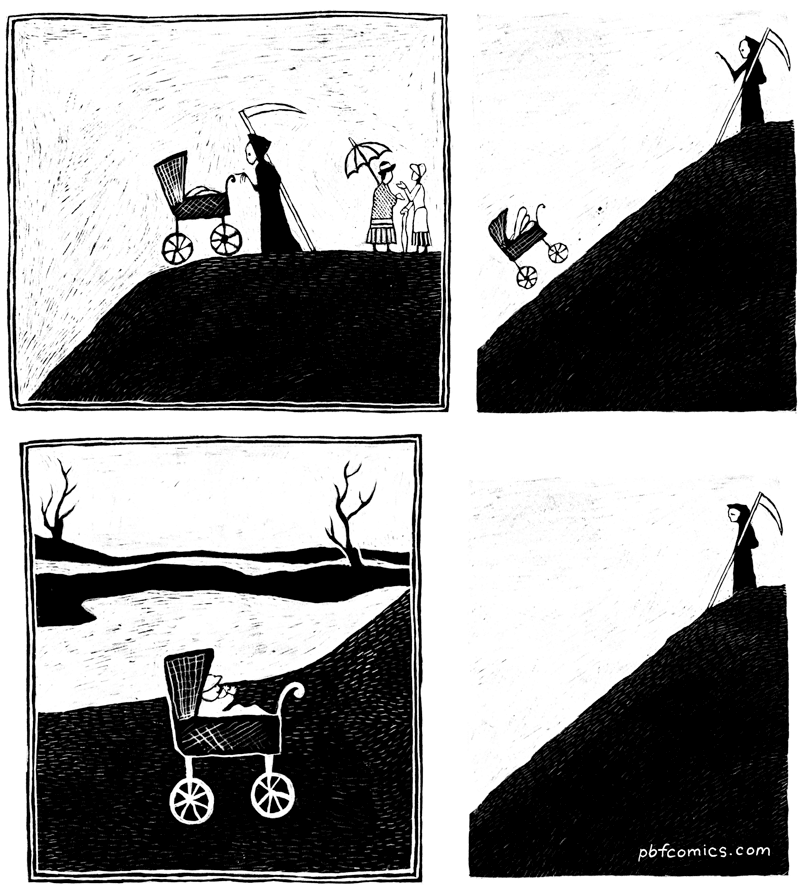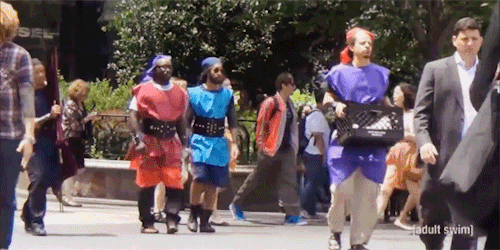benjipwns
Banned
https://www.washingtonpost.com/outl...af9cae-7dd5-11e7-83c7-5bd5460f0d7e_story.html
No, the comments don't seem to answer the question either:
But this comment answers the question and all questions that could be asked:
In a sepia-toned portrait that looks like a dark relic of the Soviet era, five figures stand frowning in profile: Karl Marx, Friedrich Engels, Vladimir Lenin, Joseph Stalin and finally a computer-generated hot dog wearing green headphones. The image appeared on Twitter in mid-July, where it circulated among various casual users before finding its way to my feed. The wiener is not a socialist icon; in fact, he is a breakdancing sausage from a Snapchat filter. His inclusion in a lineup of the U.S.S.R.s patron saints doesnt mean anything. Maybe nothing does.
I am not a nihilist, but a mood of grim, jolly absurdism comes over me often, as it seems to come over many of my young peers. To visit millennial comedy, advertising and memes is to spend time in a dream world where ideas twist and suddenly vanish; where loops of self-referential quips warp and distort with each iteration, tweaked by another user embellishing on someone elses joke, until nothing coherent is left; where beloved childrens character Winnie the Pooh is depicted in a fan-made comic strip as a 9/11 truther, and grown men in a parody ad dance to shrill synth beats while eating Totinos pizza rolls out of a tiny pink backpack. In this weird world of the surreal and bizarre, horror mingles with humor, and young people have space to play with emotions that seem more and more to proceed from ordinary life the creeping suspicion that the world just doesnt make sense.
Tim Heidecker and Eric Wareheim are a pair of comedians whose work exists in the zone of the weird and grotesque, veering wildly between horror and humor. They made their debut on Adult Swim, basic cables top programming among 18-to-34-year-olds, back in 2006 and are due to release a new season of their series Tim & Erics Bedtime Stories this fall. Their skits run the gamut from slightly to extremely surreal, with low-fi, retro graphics; distorted audio; and disjointed editing adding to the eerie feel. In one sketch, Tim and Eric compete in an increasingly deranged commercial to sell prices fine European prices, premium prices, American-made prices, extremely small prices no products, just prices. It feels interesting to live in that surreal moment versus the horror of reality sometimes, Wareheim told me, citing the prolonged, agonizingly uncomfortable shots and freakish close-ups in their show. Theres a sense of dull dread running through Heidecker and Wareheims work, but theres also relief, an invitation to laugh at the awkward and absurd. Its an expression of that fear and anxiety, Wareheim said, referring to one of their many skits focused on the tension of daily life. But I just feel like its fun to watch our show, and you are transported to another dimension of similar things, but its not real, so youre just like ahh . . . its a pleasant surreal world.
Tim and Eric are not alone. Other shows, such as Adult Swims Rick and Morty and Netflixs BoJack Horseman, follow in this vein, imagining, as New Yorker critic Emily Nussbaum put it, bleakness and joy in a teeming, surreal alternative universe. Advertising aimed at young people, too, exhibits the trend. Consider a 2012 candy ad in which two teenagers stand nervously under the bleachers; one picks Skittles pox off the others pasty skin, then pops them in her mouth. Unlike the subcultural stoner comedy of yesteryear or the giddily absurd humor of classics like Monty Python, this breed of millennial surrealism is both mainstream and tangibly dark it aims for wide swaths of young people, leaning in to feelings of worry, failure and dread.
Meanwhile, online culture allows more people to get in on the action, producing their own contributions to the meaningless, loopy, sometimes-sinister whirling gyre of the moment in the form of memes. In the simplest terms, memes are any pieces of cultural information that spread among groups by imitation, changing bit by bit along the way. In other words, distortion is a key attribute of this form, a warping effect that occurs as each instance of a meme grows more distant from its origin, sometimes losing any meaning whatsoever. (Gallows humor about the late Cincinnati Zoo gorilla Harambe, for instance, has transformed into a whole genre of jokes only tenuously related to the original ape.) For millennials, memes form the backdrop of life online.
Adam Downer is a 26-year-old associate staff editor at Know Your Meme, an online encyclopedia of the form where the oldest staffer tops out at about age 32, Downer told me. He spends his days scouring the Net for memes, documenting their origins and, when possible, explaining to readers what they mean. Since 2008, Know Your Memes staff has indexed some 11,228 memes and adds new entries to its database every day. The strangest meme he ever worked on, Downer says, was a bizarre mind-virus called Hey Beter. The meme consists of four panels, the first including the phrase Hey Beter, a riff on Hey Peter, referring to the main character of the comedy cartoon series Family Guy. What comes next seems to make even less sense: In one iteration, the Sesame Street character Elmo (wearing a suck my a-- T-shirt) calls out to Peter, then asks him to spell whomstve, then blasts him with blue lasers. In the final panel, readers are advised to follow for a free iphone 5. (There is no prize.) That one was inexplicably popular, Downer told me. I think it got popular because it was this giant emptiness of meaning. It was this giant race to the bottom of irony.
In his book The Weird and the Eerie, author Mark Fisher points out that, in most cases, the response to the apparition of a grotesque object will involve laughter as much as revulsion. And the weird, Fisher goes on, is a signal that the concepts and frameworks which we have previously employed are now obsolete. By staking out a playful space to meditate on emotions that are usually upsetting (like the dread and anxiety of living in a thoroughly postmodern world), millennial surrealism intermixes relief with stress and levity with lunacy.
There may be no mixture better suited for getting through ordinary life. In July, researchers at Harvard University announced that they had managed to store a gif inside living bacteria by altering the bacteriums DNA. For scientists, the strange little success heralded important achievements in gene modification. Twitter user Honkimus Maximus welcomed the news with a meme depicting the Simpsons character Mr. Burns googly-eyed and sedate, receiving an injection of memes directly into his veins. S O O N, Maximus captioned the image. It already feels like now.
No, the comments don't seem to answer the question either:
abrooklynite
1:41 PM EDT [Edited]
Their children shows were bizarre, break neck, nonsensical, and brightly colored. I am an older millenial, on the border with gen x, and the tastes that molded them are completely different than mine. Some things I remember my cousins watching, like fairly odd parents, is like the effects of a coke and sugar binge compared to the looney tunes I watched as a kid. It was extremely random and with little set up to the jokes.
I honestly can't find any of it funny. It is always dumber and less clever than people think it is. People will say you're not smart enough to get it, but the problem is I do get it, instantly, and it is boorish or boring. It is obvious or too random.
neverlookback
4:00 PM EDT
Sorry honey, stupidity isn't Cleverness. The same old, same old isn't innovation. And drawing a smile on a shoe isn't art.
I have no problem with Millennials liking whatever they like, as self-indulgent and repetitious as it might be. I definitely share the
notions of absurdness, nonsense and meaning in meaningless, but I don't think thinking that way is genius. Sorry.
acarldominic1
3:12 PM EDT
When you don't read, write, or substantively think about a world not defined on a social media platform; you produce juvenile cotton candy comedy.
Elk Watcher
4:26 PM EDT
I find it far more disturbing that only 19% of millennials would object to a military takeover of this country. If anyone thinks things are strange now - consider the idiocy of Trump - living under a military dictatorship would be horrific.
TheCeeMan
3:43 PM EDT
If late, late middle-aged guys like me loved Millennials' music and/or humor then it would be, by definition, no good. My parents didn't think Monty Python was funny and they pretty much hated any rock I listened too. It's just generational.
Curmudgeon10
2:01 PM EDT
With all that disaffection, loneliness, and disconnection from work --- truly impressive stats --- it makes you want to turn back the clock and become a millenial. It looks like a successful program in avoiding the toughest of things: life.
jackl31
1:10 PM EDT
The best humor has meaning. The humor of the golden age of Mort Sahl, George Carlin, Bob Newhart, Joan Rivers, et. al. hinged on a commentary on life or people. The meaning of current humor is that life has no meaning.
Buscador de la verdad
6:46 PM EDT
I'm apparently a millenial, born in '84. I do not identify with that group however. They are just as weird to me as they are to you mom and dad. Also, no one likes Tim and Eric. I have asked at least 40 people that I know why that show is even airing. No one can give me an answer.
peacecatman1
6:10 PM EDT
Maybe if you stopped staring at your phone and talked to the person at the table with you who is also staring at their phone, you might find some meaning to life, or at least you might use a brain cell or two, instead of acting like a zombie.
drpickerel
5:05 PM EDT
Huh? Looking for deep meaning in online cr*p? Gimme a break, Elizabeth and all the others who'vestve wasted a big chunk of their lives playing with phones in the world's largest clique, chasing 19, 21, I love you huskies and what ever else lame junk they think is important and even worse, funny, are pathetic.
The guys selling prices nailed it! It's all fake, google and fb are global advertising malware and no one ever clicks on ads! There are plenty of good jobs for millennials, that whine is so worn out. I work with lots of them and they're totally normal people. The online fantasy world has created a huge subculture of jello people with no skills beyond playing with phones who want to get paid for...playing with phones, at home. Go outside!
But this comment answers the question and all questions that could be asked:
Kluvon Scott
4:41 PM EDT [Edited]
That reminds me of the infamous question: If a masochist asked you to beat him, would you want to disappoint him by saying no?









